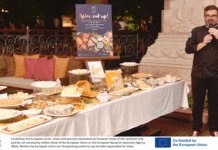
Toyo-Morton, Japan’s manufacturer of laminating adhesives and a member of the Toyo Ink Group, has updated its laminating adhesives portfolio with food-safe products that are free of epoxy silanes and organic tin compounds. The renewed lineup includes both the solvent-based Tomoflex and the solvent-free Ecoad series of laminating adhesives that are suitable for a wide range of multilayer flexible packaging applications, such as dry food, liquid pouch and high-performance retort. All products in the lineup conform to global food contact regulations for adhesives, such as the EU No.10/2011, US FDA 175.105, China GB 9685-2016 and Japan’s Notification No 196.
Epoxy silane is commonly used as an adhesion promoter in multilayer flexible packaging structures, helping to protect packaged content and extend its shelf life. Food packaging regulation has recently been tightening, primarily in the EU, due to human health safety concerns. This trend has prompted global converters and food manufacturers to seek out safer alternatives for use in multilayered flexible packaging.
“While epoxy silanes are not currently subject to regulatory control, we are proactively eliminating substances of concern from our products,” explains Joji Suzuki, director, and senior general manager of Toyo-Morton’s Technical Division. “The new lineup was formulated to address the growing regulatory demands that converters and food manufacturers face regarding food packaging safety. As a leading adhesive manufacturer, we were able to develop laminating adhesive products that are not only free of epoxy silanes and organic tin compounds, but also offer the same physical properties and performance levels as regular products. Toyo-Morton remains committed to delivering adhesive solutions that enable our customers to achieve the highest performance and food safety standards.”
IndiFoodBev — authentic, impactful and influential
An English-language food and beverage processing and packaging industry B2B platform in print and web, IndiFoodBev is in its third year of publication. It is said that the Indian food and beverage industries represent approximately US$ 900 billion in revenues which implies more than 20% of the country’s GDP. Eliminating the wastage on the farmside can help to deliver more protein to a higher number of the population apart from generating sizable exports. The savings in soil, seeds, water, fertilizer, energy and ultimately food and nutrition could be the most immense contribution that country is poised to make to the moderation of climate change.
To improve your marketing and grow sales to the food and beverage processing and packaging industry, talk to us. Our research and consulting company IppStar [www.ippstar.org] can assess your potential and addressable markets in light of the competition. We can discuss marketing, communication, and sales strategies for market entry and growth.
Suppliers and service providers with a strategy and budget for targeted marketing can discuss using our hybrid print, web, video, and social media channels to create brand recognition linked to market relevance. Our technical writers are ready to meet you and your customers for content.
The second largest producer of fruit and vegetables in the world is continuously expanding processing capacities and delivery systems with appropriate innovative technologies. We cover product and consumer trends, nutrition, processing, research, equipment and packaging from farm to thali. Get our 2025 media kit and recalibrate your role in this dynamic market. Enhance your visibility and relevance to existing markets and turn potential customers into conversations. Ask for a sample copy of our bi-monthly in print or our weekly IndiFoodBev eZine each Wednesday.
For editorial info@ippgroup.in — for advertisement ads1@ippgroup.in and for subscriptions subscription@ippgroup.in
Naresh Khanna – 10 February 2025
Subscribe Now










